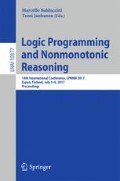Abstract
We provide an initial study on the Hasse diagram that represents the partial order -w.r.t. set inclusion- among weighted sceptical semantics in Argumentation: grounded, ideal, and eager. Being our framework based on a parametric structure of weights, we can directly compare weighted and classical approaches. We define a unique-status weighted grounded semantics, and we prove that the lattice of strongly-admissible extensions becomes a semi-lattice.
Access this chapter
Tax calculation will be finalised at checkout
Purchases are for personal use only
Notes
- 1.
The eager is a unique-status semantics only for finite AAFs [1], which we study in this paper.
- 2.
- 3.
Since Dung’s definitions of semantics are directly encompassed by our framework (just by using the Boolean semiring), we do not introduce them in this paper for the sake of brevity.
References
Baumann, R., Spanring, C.: Infinite argumentation frameworks. In: Eiter, T., Strass, H., Truszczyński, M., Woltran, S. (eds.) Advances in Knowledge Representation, Logic Programming, and Abstract Argumentation. LNCS, vol. 9060, pp. 281–295. Springer, Cham (2015). doi:10.1007/978-3-319-14726-0_19
Bistarelli, S., Montanari, U., Rossi, F.: Semiring-based constraint satisfaction and optimization. J. ACM 44(2), 201–236 (1997)
Bistarelli, S., Rossi, F., Santini, F.: A collective defence against grouped attacks for weighted abstract argumentation frameworks. In: Florida Artificial Intelligence Research Society Conference, Flairs, pp. 638–643. AAAI (2016)
Bistarelli, S., Rossi, F., Santini, F.: A relaxation of internal conflict and defence in weighted argumentation frameworks. In: Michael, L., Kakas, A. (eds.) JELIA 2016. LNCS (LNAI), vol. 10021, pp. 127–143. Springer, Cham (2016). doi:10.1007/978-3-319-48758-8_9
Bistarelli, S., Santini, F.: A common computational framework for semiring-based argumentation systems. In: ECAI - European Conference on Artificial Intelligence. FAIA, vol. 215, pp. 131–136. IOS (2010)
Bistarelli, S., Santini, F.: Coalitions of arguments: an approach with constraint programming. Fundam. Inform. 124(4), 383–401 (2013)
Caminada, M.: Comparing two unique extension semantics for formal argumentation: ideal and eager. In: Belgian-Dutch Conference on Artificial Intelligence (BNAIC), pp. 81–87 (2007)
Coste-Marquis, S., Konieczny, S., Marquis, P., Ouali, M.A.: Weighted attacks in argumentation frameworks. In: Principles of Knowledge Representation and Reasoning (KR), pp. 593–597. AAAI (2012)
Dung, P.M.: On the acceptability of arguments and its fundamental role in nonmonotonic reasoning, logic programming and n-person games. Artif. Intell. 77(2), 321–357 (1995)
Dung, P.M., Mancarella, P., Toni, F.: A dialectic procedure for sceptical, assumption-based argumentation. In: Computational Models of Argument (COMMA). FAIA, vol. 144, pp. 145–156. IOS (2006)
Dunne, P.E., Hunter, A., McBurney, P., Parsons, S., Wooldridge, M.: Weighted argument systems: basic definitions, algorithms, and complexity results. Artif. Intell. 175(2), 457–486 (2011)
Martínez, D.C., García, A.J., Simari, G.R.: An abstract argumentation framework with varied-strength attacks. In: Principles of Knowledge Representation and Reasoning (KR), pp. 135–144. AAAI (2008)
Verheij, B.: Two approaches to dialectical argumentation: admissible sets and argumentation stages. In: Dutch Conference on Artificial Intelligence, vol. 96, pp. 357–368 (1996)
Author information
Authors and Affiliations
Corresponding author
Editor information
Editors and Affiliations
Rights and permissions
Copyright information
© 2017 Springer International Publishing AG
About this paper
Cite this paper
Bistarelli, S., Santini, F. (2017). A Hasse Diagram for Weighted Sceptical Semantics with a Unique-Status Grounded Semantics. In: Balduccini, M., Janhunen, T. (eds) Logic Programming and Nonmonotonic Reasoning. LPNMR 2017. Lecture Notes in Computer Science(), vol 10377. Springer, Cham. https://doi.org/10.1007/978-3-319-61660-5_6
Download citation
DOI: https://doi.org/10.1007/978-3-319-61660-5_6
Published:
Publisher Name: Springer, Cham
Print ISBN: 978-3-319-61659-9
Online ISBN: 978-3-319-61660-5
eBook Packages: Computer ScienceComputer Science (R0)

